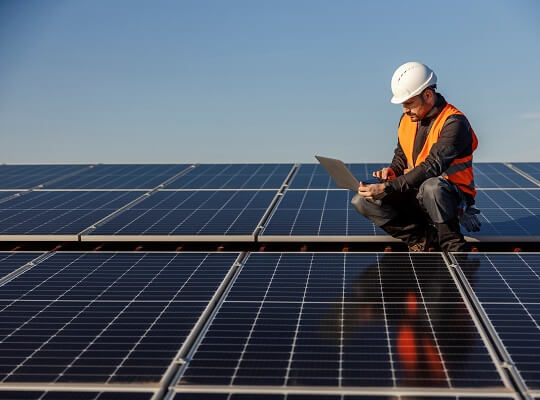Solar Photovoltaic Systems Explained: The Perfect Option for Renewable Energy in Your Business
Solar Photovoltaic Systems Explained: The Perfect Option for Renewable Energy in Your Business
Blog Article
Why Solar Energy Installment Is the Smart Option for Your Home or Business
The decision to install solar energy in your home or service is significantly identified as a critical financial investment, driven by a combination of monetary rewards and ecological considerations. With the capacity for substantial energy cost savings, combined with government incentives, the first expenses can be offset dramatically. In addition, welcoming solar energy not just enhances your home's value yet also adds to an extra lasting future. Nonetheless, the effects of this option extend beyond mere cost savings and aesthetics, triggering a more detailed assessment of the more comprehensive advantages and potential challenges connected with solar energy fostering.
Financial Cost Savings and Incentives
Spending in solar energy installations can dramatically minimize power prices for home owners and companies alike. By taking advantage of energy from the sunlight, residential properties can produce their own electrical power, resulting in significant savings on regular monthly utility expenses. In most cases, these cost savings can balance out the preliminary installment expenses within a few years, providing an eye-catching return on investment.
In addition, many economic motivations exist to urge solar fostering. Federal tax obligation credit reports, such as the Investment Tax Obligation Debt (ITC), enable home owners and organizations to subtract a significant portion of solar installment expenses from their federal taxes. solar photovoltaic. Many states and city governments additionally supply rebates, grants, or performance-based rewards, additionally enhancing the price of solar systems
Funding choices, including solar fundings and leases, are offered to reduce the upfront monetary burden. Via these setups, building owners can spread out the price of installation with time, usually paying much less than their previous electrical energy expenses.
Furthermore, the raising value of residential or commercial properties geared up with planetary systems makes them extra attractive in the property market. Overall, the economic advantages of solar energy setups are compelling, making them a wise financial investment for the future.
Environmental Effect and Sustainability

Additionally, solar setups can lower dependence on non-renewable sources, such as coal and gas, which can cause habitat damage and contamination through removal and combustion procedures. By transitioning to solar power, homeowners and companies proactively participate in reducing their carbon footprint, promoting a much healthier ecological community.
In addition, the manufacturing of photovoltaic panels has actually come to be more efficient and less dangerous to the atmosphere for many years. Several manufacturers my sources are now committed to utilizing lasting methods, including recycling products and lessening waste.
Power Freedom and Security
Attaining power independence with solar power installments encourages people and areas to lower their dependence on imported fossil gas. This shift not only boosts local power safety yet additionally supports energy expenses in time. With solar energy, home owners and companies can create their own electricity, minimizing the influence of varying energy rates driven by worldwide markets.
Solar installations give a sustainable choice that aids barrier versus geopolitical tensions and supply chain disturbances associated with fossil fuel dependence. By harnessing sunshine, areas can cultivate a self-sufficient power framework, guaranteeing regular access to power regardless of outside elements. This self-reliance cultivates economic strength, as energy manufacturing becomes localized, maintaining more financial resources within the area.
Additionally, the transition to solar power adds to grid stability. Dispersed planetary systems can minimize stress on traditional power grids, lowering the probability of power outages throughout peak demand periods. As even more entities adopt solar modern technology, the cumulative change in the direction of sustainable power resources amplifies the overall security of the energy landscape. Ultimately, accepting solar power not only advertises specific and neighborhood empowerment yet likewise supports national objectives for a lasting and trusted power future.

Technological Improvements in Solar
Innovations in solar innovation are changing the means power is utilized and used, better supporting the energy independence achieved with solar installments. Innovations in solar (PV) cells, especially the development of bifacial panels, enable for boosted power capture by soaking up sunshine from both sides. This technology enhances efficiency and maximizes energy outcome, making solar setups a lot more effective than ever before.
Additionally, renovations in power storage space remedies, such as lithium-ion batteries, offer house owners and services the capacity to keep excess power produced throughout optimal sunshine hours. This capacity makes certain a constant power supply during periods of low sunlight, boosting energy reliability and lowering reliance on the grid.
Smart inverters have likewise arised as a vital component of modern solar systems, giving real-time surveillance and optimization of power usage (solar photovoltaic). These systems make it possible for individuals to handle their power consumption wisely, bring about reduced prices and improved effectiveness